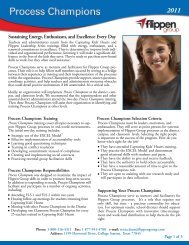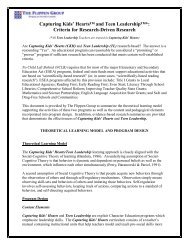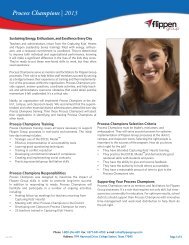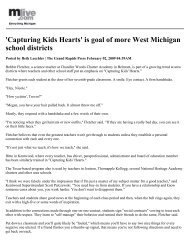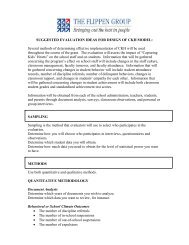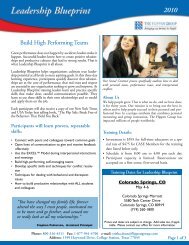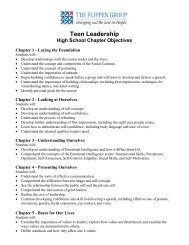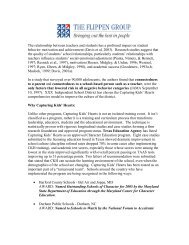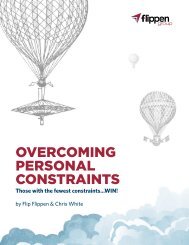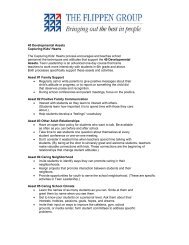Smart & Good High Schools - The Flippen Group
Smart & Good High Schools - The Flippen Group
Smart & Good High Schools - The Flippen Group
- No tags were found...
You also want an ePaper? Increase the reach of your titles
YUMPU automatically turns print PDFs into web optimized ePapers that Google loves.
CHAPTER 5: Fostering the 8 Strengths of Character—Outcome 8comes (treating morality under Ethical Thinker, forexample, and emotion under Socially and EmotionallySkilled Person). Under Spiritual Person, we will also giveparticular attention to category 8, the deepening and livingout of one’s own faith (taken in the broadest sense toinclude both theistic and other worldviews) and learningto understand and appreciate faith perspectives differentfrom one’s own.Why Purpose MattersIn his classic 1959 book Man’s Search for Meaning, consideredone of the most influential books of the 20th century,concentration camp survivor Viktor Frankl wrote:Man’s search for meaning is a primary force in his life . . .[<strong>The</strong>re is a] will to meaning. Man is able to live and evento die for the sake of his ideals and values. 7Our search for meaning helps us find a purpose for ourindividual lives. In their 2003 article, “<strong>The</strong> Developmentof Purpose During Adolescence,” Stanford University psychologistWilliam Damon and colleagues note: “<strong>The</strong> fieldof psychology has been slow to recognize the importanceof purpose for positive youth development.” <strong>The</strong>y pointout that only recently has purpose been recognized as “amotivator of good deeds and galvanizer of charactergrowth.” 8Are our schools helping students develop a sense of purpose,which we believe animates and guides the developmentof all the other strengths of character? Or, withoutintending to, do we abandon our young to unexaminedvalues—hedonism for some, frenetic achievement for others—thatwill not make them happy in their lives or helpthem become good family members, workers, and citizenswho contribute to the lives of others?“I don’t want to reach the age of 60 oreven 40 and have someone ask mewhat the meaning of life is and haveto reply, ‘I have no idea.’”A few years ago the Associated Press carried a story abouta 17-year-old senior in California who received double800s on her SAT’s. She was known to her high schoolfriends as “Wonder Woman.” In the course of an interview,a reporter asked her, “What is the meaning of life?”She replied, “I have no idea.” 9One recent high school graduate, hearing the abovestory, had this reaction:I don’t want to reach the age of 60 or even 40 and havesomeone ask me what the meaning of life is and have toreply, “I have no idea.” I see so many people just goingthrough the motions: get into a good school, so you canget into a good college, so you can get a good job, so youcan get a better job, so you can get rich and die. I wantmore than knowledge. I want wisdom. I don’t just want toexist—I want to live. 10Lamenting that most schools currently don’t help studentsthink about questions of meaning and purpose, oneteacher said: “We condition students to believe thatgrades and test scores—not reflection on life—are thegoals of education.” A girl on our Student Leaders Panelspoke of her own experience:From the start of my freshman year, I have been thinkingabout how my actions and class choices will affect mychances of getting into my top choice of college. As aresult, my friends and I don’t take classes we are reallyinterested in. This is only teaching us that the way to besuccessful in life is to focus on getting ahead and beingsmarter, stronger, and generally better than everyone else.No one seems to think about careers that will challengethem and keep them interested and happy at work eachday. Instead, the only “good” jobs are the ones that willprovide a large salary.We condition students to believe thatgrades and test scores—not reflectionon life—are the goals of education.Living a Life That MattersWhen we don’t engage in a self-reflective search formeaning and purpose, we lack a moral and spiritual rudder.We may find ourselves doing things that do notreflect our best self—and that subvert our characterdevelopment and hopes for happiness. In his book, Liv-Compared with their grandparents,today’s young adults have grown upwith more affluence and much greaterrisk of depression and associated socialpathology.—DAVID MYERS 11195<strong>Smart</strong> & <strong>Good</strong> <strong>High</strong> <strong>Schools</strong>



